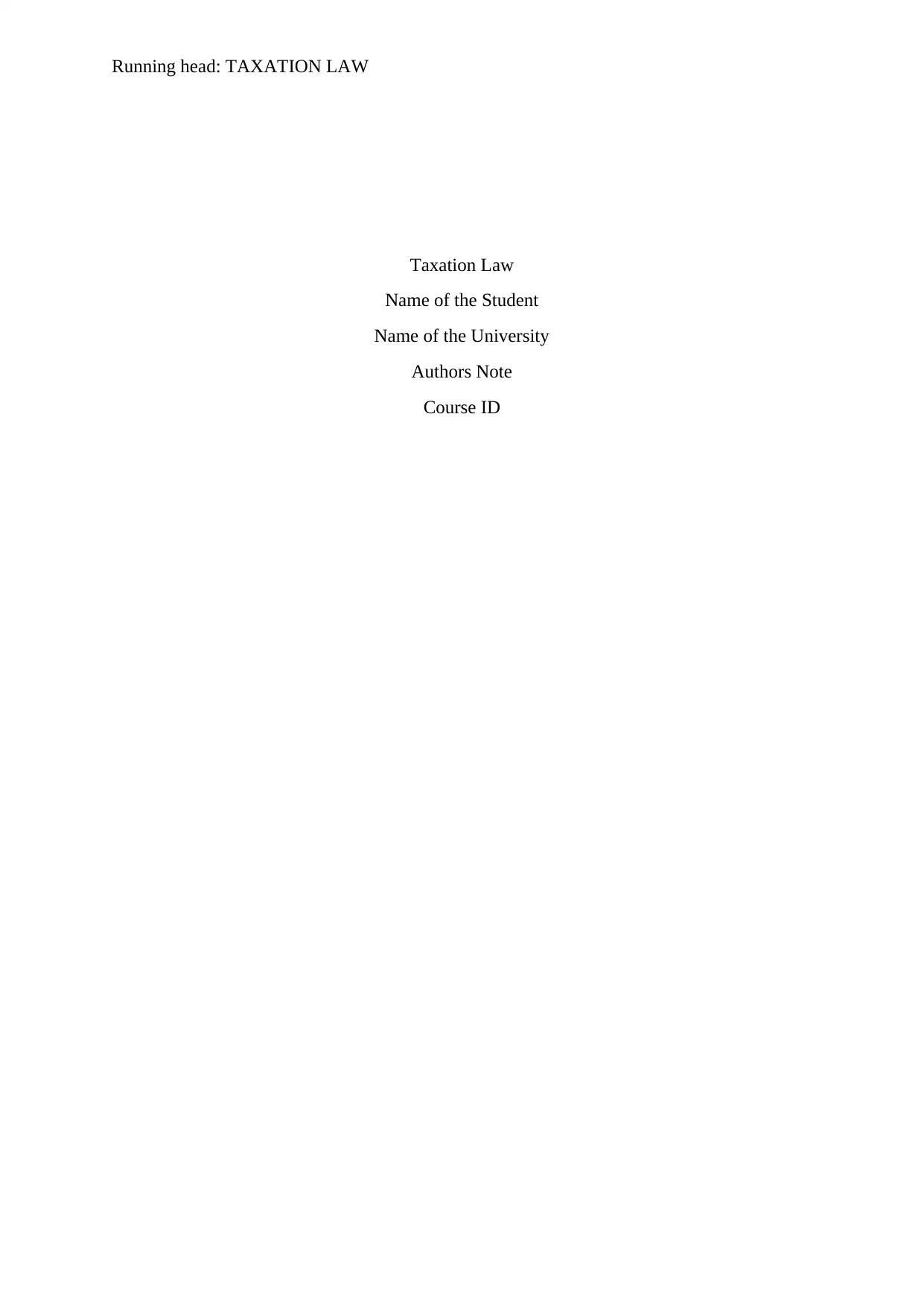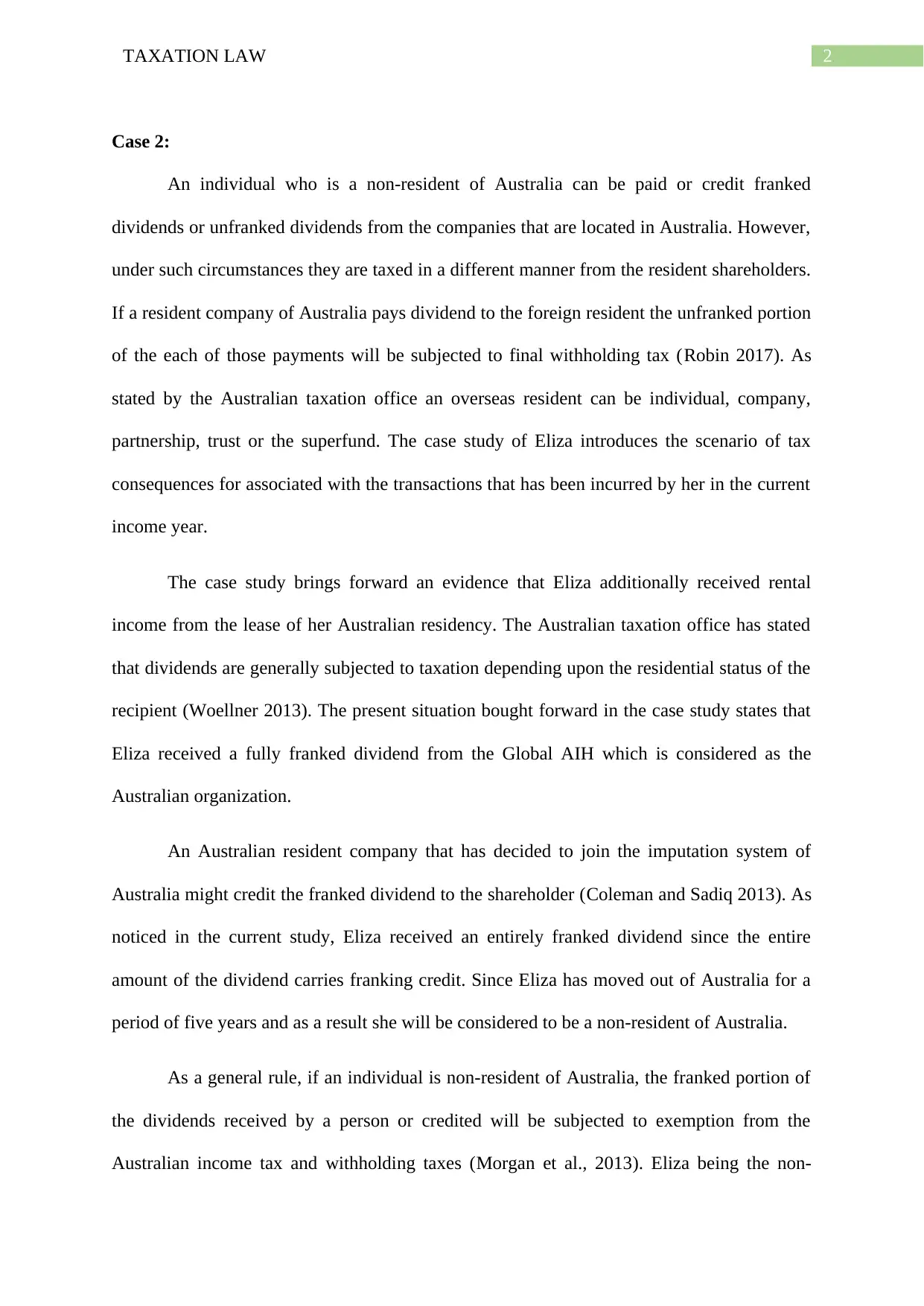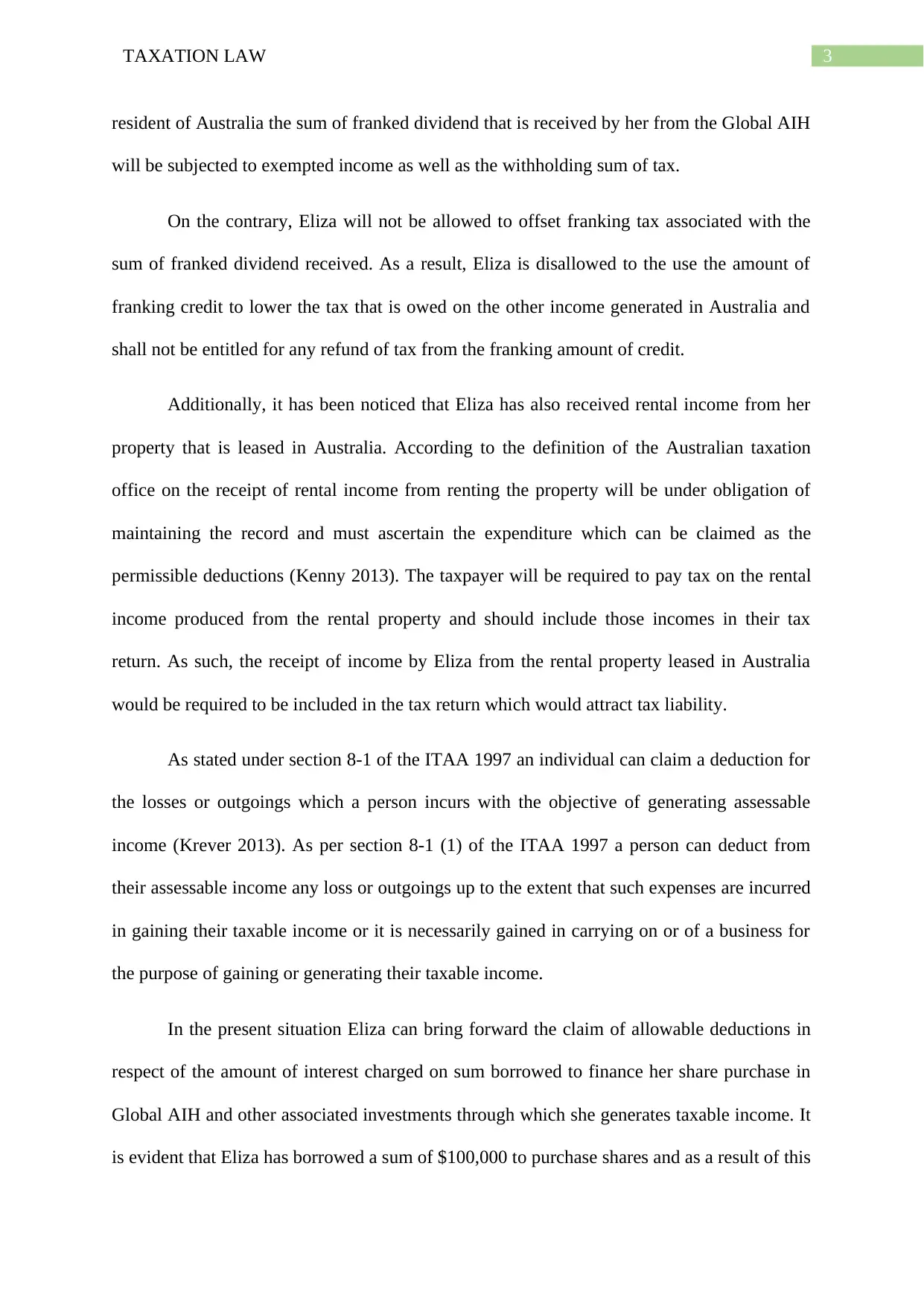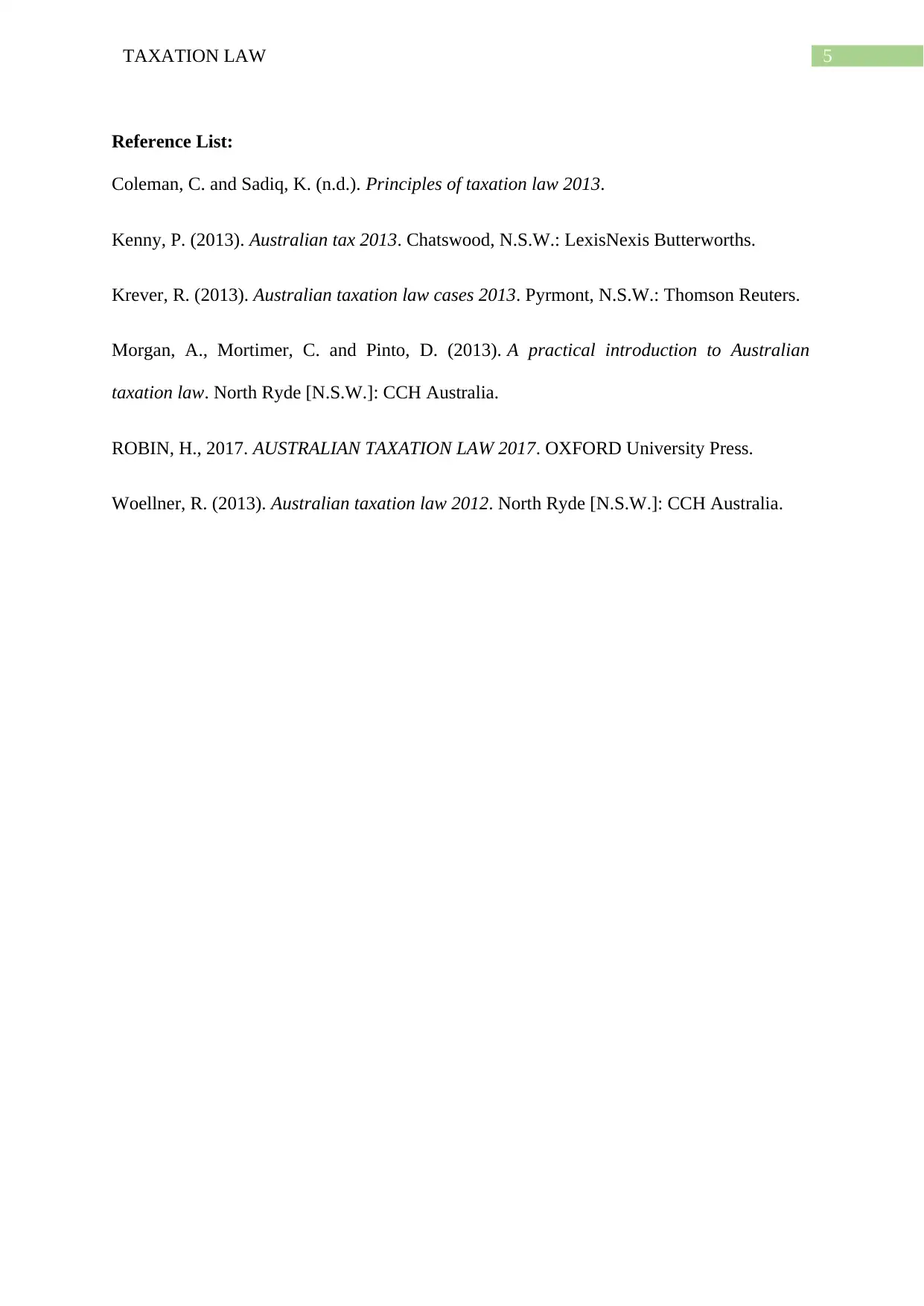Taxation Law Case Study: Australian Taxation of Non-Residents
VerifiedAdded on 2020/04/13
|6
|928
|71
Case Study
AI Summary
This case study examines the taxation implications for Eliza, a non-resident of Australia, focusing on her income from franked dividends and rental property. The analysis covers how the Australian taxation system treats franked dividends received by non-residents, highlighting the exemption from income tax and withholding taxes, but also the inability to offset franking credits. Additionally, the study addresses the tax obligations associated with Eliza's rental income, emphasizing the requirement to include this income in her tax return. Furthermore, the case study explores the application of section 8-1 of the ITAA 1997, allowing Eliza to claim allowable deductions for interest expenses incurred on a loan used to purchase shares, thus generating taxable income. The study references relevant Australian taxation laws and provides a comprehensive understanding of the tax liabilities and deductions applicable to Eliza's financial transactions.

Running head: TAXATION LAW
Taxation Law
Name of the Student
Name of the University
Authors Note
Course ID
Taxation Law
Name of the Student
Name of the University
Authors Note
Course ID
Paraphrase This Document
Need a fresh take? Get an instant paraphrase of this document with our AI Paraphraser

1TAXATION LAW
Table of Contents
Case 2:........................................................................................................................................2
Reference List:...........................................................................................................................5
Table of Contents
Case 2:........................................................................................................................................2
Reference List:...........................................................................................................................5

2TAXATION LAW
Case 2:
An individual who is a non-resident of Australia can be paid or credit franked
dividends or unfranked dividends from the companies that are located in Australia. However,
under such circumstances they are taxed in a different manner from the resident shareholders.
If a resident company of Australia pays dividend to the foreign resident the unfranked portion
of the each of those payments will be subjected to final withholding tax (Robin 2017). As
stated by the Australian taxation office an overseas resident can be individual, company,
partnership, trust or the superfund. The case study of Eliza introduces the scenario of tax
consequences for associated with the transactions that has been incurred by her in the current
income year.
The case study brings forward an evidence that Eliza additionally received rental
income from the lease of her Australian residency. The Australian taxation office has stated
that dividends are generally subjected to taxation depending upon the residential status of the
recipient (Woellner 2013). The present situation bought forward in the case study states that
Eliza received a fully franked dividend from the Global AIH which is considered as the
Australian organization.
An Australian resident company that has decided to join the imputation system of
Australia might credit the franked dividend to the shareholder (Coleman and Sadiq 2013). As
noticed in the current study, Eliza received an entirely franked dividend since the entire
amount of the dividend carries franking credit. Since Eliza has moved out of Australia for a
period of five years and as a result she will be considered to be a non-resident of Australia.
As a general rule, if an individual is non-resident of Australia, the franked portion of
the dividends received by a person or credited will be subjected to exemption from the
Australian income tax and withholding taxes (Morgan et al., 2013). Eliza being the non-
Case 2:
An individual who is a non-resident of Australia can be paid or credit franked
dividends or unfranked dividends from the companies that are located in Australia. However,
under such circumstances they are taxed in a different manner from the resident shareholders.
If a resident company of Australia pays dividend to the foreign resident the unfranked portion
of the each of those payments will be subjected to final withholding tax (Robin 2017). As
stated by the Australian taxation office an overseas resident can be individual, company,
partnership, trust or the superfund. The case study of Eliza introduces the scenario of tax
consequences for associated with the transactions that has been incurred by her in the current
income year.
The case study brings forward an evidence that Eliza additionally received rental
income from the lease of her Australian residency. The Australian taxation office has stated
that dividends are generally subjected to taxation depending upon the residential status of the
recipient (Woellner 2013). The present situation bought forward in the case study states that
Eliza received a fully franked dividend from the Global AIH which is considered as the
Australian organization.
An Australian resident company that has decided to join the imputation system of
Australia might credit the franked dividend to the shareholder (Coleman and Sadiq 2013). As
noticed in the current study, Eliza received an entirely franked dividend since the entire
amount of the dividend carries franking credit. Since Eliza has moved out of Australia for a
period of five years and as a result she will be considered to be a non-resident of Australia.
As a general rule, if an individual is non-resident of Australia, the franked portion of
the dividends received by a person or credited will be subjected to exemption from the
Australian income tax and withholding taxes (Morgan et al., 2013). Eliza being the non-
⊘ This is a preview!⊘
Do you want full access?
Subscribe today to unlock all pages.

Trusted by 1+ million students worldwide

3TAXATION LAW
resident of Australia the sum of franked dividend that is received by her from the Global AIH
will be subjected to exempted income as well as the withholding sum of tax.
On the contrary, Eliza will not be allowed to offset franking tax associated with the
sum of franked dividend received. As a result, Eliza is disallowed to the use the amount of
franking credit to lower the tax that is owed on the other income generated in Australia and
shall not be entitled for any refund of tax from the franking amount of credit.
Additionally, it has been noticed that Eliza has also received rental income from her
property that is leased in Australia. According to the definition of the Australian taxation
office on the receipt of rental income from renting the property will be under obligation of
maintaining the record and must ascertain the expenditure which can be claimed as the
permissible deductions (Kenny 2013). The taxpayer will be required to pay tax on the rental
income produced from the rental property and should include those incomes in their tax
return. As such, the receipt of income by Eliza from the rental property leased in Australia
would be required to be included in the tax return which would attract tax liability.
As stated under section 8-1 of the ITAA 1997 an individual can claim a deduction for
the losses or outgoings which a person incurs with the objective of generating assessable
income (Krever 2013). As per section 8-1 (1) of the ITAA 1997 a person can deduct from
their assessable income any loss or outgoings up to the extent that such expenses are incurred
in gaining their taxable income or it is necessarily gained in carrying on or of a business for
the purpose of gaining or generating their taxable income.
In the present situation Eliza can bring forward the claim of allowable deductions in
respect of the amount of interest charged on sum borrowed to finance her share purchase in
Global AIH and other associated investments through which she generates taxable income. It
is evident that Eliza has borrowed a sum of $100,000 to purchase shares and as a result of this
resident of Australia the sum of franked dividend that is received by her from the Global AIH
will be subjected to exempted income as well as the withholding sum of tax.
On the contrary, Eliza will not be allowed to offset franking tax associated with the
sum of franked dividend received. As a result, Eliza is disallowed to the use the amount of
franking credit to lower the tax that is owed on the other income generated in Australia and
shall not be entitled for any refund of tax from the franking amount of credit.
Additionally, it has been noticed that Eliza has also received rental income from her
property that is leased in Australia. According to the definition of the Australian taxation
office on the receipt of rental income from renting the property will be under obligation of
maintaining the record and must ascertain the expenditure which can be claimed as the
permissible deductions (Kenny 2013). The taxpayer will be required to pay tax on the rental
income produced from the rental property and should include those incomes in their tax
return. As such, the receipt of income by Eliza from the rental property leased in Australia
would be required to be included in the tax return which would attract tax liability.
As stated under section 8-1 of the ITAA 1997 an individual can claim a deduction for
the losses or outgoings which a person incurs with the objective of generating assessable
income (Krever 2013). As per section 8-1 (1) of the ITAA 1997 a person can deduct from
their assessable income any loss or outgoings up to the extent that such expenses are incurred
in gaining their taxable income or it is necessarily gained in carrying on or of a business for
the purpose of gaining or generating their taxable income.
In the present situation Eliza can bring forward the claim of allowable deductions in
respect of the amount of interest charged on sum borrowed to finance her share purchase in
Global AIH and other associated investments through which she generates taxable income. It
is evident that Eliza has borrowed a sum of $100,000 to purchase shares and as a result of this
Paraphrase This Document
Need a fresh take? Get an instant paraphrase of this document with our AI Paraphraser

4TAXATION LAW
she incurs an interest of $5650 as the expense for the sum borrowed. In respect of section 8-1
of the ITAA 1997 Eliza can claim allowable deductions since the expenses were incurred in
gaining taxable income.
she incurs an interest of $5650 as the expense for the sum borrowed. In respect of section 8-1
of the ITAA 1997 Eliza can claim allowable deductions since the expenses were incurred in
gaining taxable income.

5TAXATION LAW
Reference List:
Coleman, C. and Sadiq, K. (n.d.). Principles of taxation law 2013.
Kenny, P. (2013). Australian tax 2013. Chatswood, N.S.W.: LexisNexis Butterworths.
Krever, R. (2013). Australian taxation law cases 2013. Pyrmont, N.S.W.: Thomson Reuters.
Morgan, A., Mortimer, C. and Pinto, D. (2013). A practical introduction to Australian
taxation law. North Ryde [N.S.W.]: CCH Australia.
ROBIN, H., 2017. AUSTRALIAN TAXATION LAW 2017. OXFORD University Press.
Woellner, R. (2013). Australian taxation law 2012. North Ryde [N.S.W.]: CCH Australia.
Reference List:
Coleman, C. and Sadiq, K. (n.d.). Principles of taxation law 2013.
Kenny, P. (2013). Australian tax 2013. Chatswood, N.S.W.: LexisNexis Butterworths.
Krever, R. (2013). Australian taxation law cases 2013. Pyrmont, N.S.W.: Thomson Reuters.
Morgan, A., Mortimer, C. and Pinto, D. (2013). A practical introduction to Australian
taxation law. North Ryde [N.S.W.]: CCH Australia.
ROBIN, H., 2017. AUSTRALIAN TAXATION LAW 2017. OXFORD University Press.
Woellner, R. (2013). Australian taxation law 2012. North Ryde [N.S.W.]: CCH Australia.
⊘ This is a preview!⊘
Do you want full access?
Subscribe today to unlock all pages.

Trusted by 1+ million students worldwide
1 out of 6
Related Documents
Your All-in-One AI-Powered Toolkit for Academic Success.
+13062052269
info@desklib.com
Available 24*7 on WhatsApp / Email
![[object Object]](/_next/static/media/star-bottom.7253800d.svg)
Unlock your academic potential
Copyright © 2020–2026 A2Z Services. All Rights Reserved. Developed and managed by ZUCOL.



